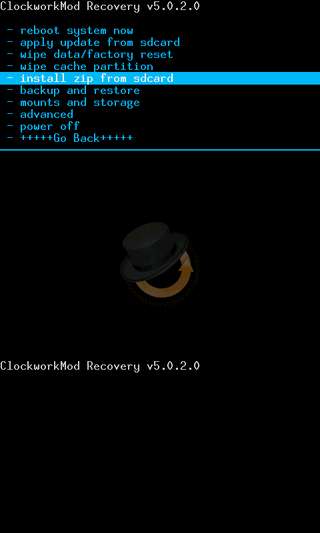How (And Why) to Overclock Your Android Device
Overclocking isn’t just for PCs. Learn how to overclock your Android for a faster phone and better battery life.
Step One: Rooting

Before you can start revving up your Android phone’s CPU, it needs to be rooted. Methods for rooting often vary slightly from model to model, but we’ve already written up a guide with a simple method that works for the majority of popular Android devices. If this method doesn’t apply to your device, the XDA Developers Forum is an excellent resource that is almost sure to have you covered.
In addition to being rooted, your device must also be using a custom recovery image, such as ClockworkMod. If it’s already rooted, there is a very good chance that you already have a custom recovery image installed; however, if you don’t, ROM Manager is a free app in the Google Play Store that can flash a custom recovery image for you.

It’s important that you know how to access your phone’s recovery mode. Again, this varies from model to model, but typically involves powering on your phone while holding down some combination of buttons. The ROM Manager app is also capable of rebooting you into recovery mode with the “Reboot into Recovery” option, should you prefer.
Sign up to get the BEST of Tom's Guide direct to your inbox.
Here at Tom’s Guide our expert editors are committed to bringing you the best news, reviews and guides to help you stay informed and ahead of the curve!
Current page: Step One: Rooting
Prev Page Why (and Why Not) to Overclock a Smartphone Next Page Step Two: Flashing a Custom Kernel-
razor512 I have my HP touchpad overclocked to 1.89GHz which is somewhat decent from the stock 1.2GHz. Really breathes new life into a dual core ARM CPU.Reply
PS wanted to add that there is a way to save battery life without losing performance.
Justy like how every CPU has it's own max overclock, every CPU also has it's own minimum voltage per given clock speed
You can extend your battery life by adjusting the voltage for each clock speed step to a lower level (to test for stability, use your overclocking app to cap the clock speed to the desired level, then run a few benchmarks)
you can generally lower almost all of the voltages and thus give your self a decent battery life boost without losing any performance, and best of all, you can still keep your overclock
simply set the lowest stable voltage for each clock speed in the list.
During what most would consider normal use, you rarely ever hit the CPU's max speed, and if you overclock, you are even less likely to hit the overclock speed (many overclocking apps will record the CPU clock speed history and you will see how little those higher clock speeds are used (but when they are used, they really show their benefit, (especially when loading web pages and launching applications)
All in all, find your max clock speed and fine your lowest voltage for each clock speed in the table, and you will have a device that bas better battery life and much faster performance
(the lower voltage tweak takes longer to do than the max overclock because you will be testing every single clock frequency in the list for stability each time you lower it's voltage -
razor512 wanted to also addReply
(sry for the typos in the previous message sees they still did not add a edit feature)
anyway, most of those benchmarks base their scores on more than just the CPU but the overclocks only really effect the CPU, (depending on the device, you can overclock the L2 cache and in some cases, even the GPU and RAM ) -
I think your Linpack results are a bit off. A higher score in Linpack is better, and the Nexus S can get 60+ MFLOPSReply
-
quantumrand HurrpancakesI think your Linpack results are a bit off. A higher score in Linpack is better, and the Nexus S can get 60+ MFLOPSReply
Very sorry, you're right! The Linpack table is incomplete. The numbers listed are the times in seconds it took to complete the test.
The stock Nexus S speeds scored an average of 16.8 MFLOPS and the 1.4GHz speeds scored 23.6 MFLOPS. While the Linpack "top scores" page lists the Nexus S getting 60+ MFLOPS, it's not actually true. Those scores are from other devices running custom ROMs ported from the Nexus S. -
zblade It is no surprise that overclocking the CPU did not do much for game benchmarks, this is no different to PC gaming unless it is a heavy CPU intensive game. You should of overclock the GPU as well. Tegrak Overclock Ultimate is what you want to use to overclock both CPU and GPU.Reply
I think people would be interested in seeing real world performance difference between overclock GPU and CPU -
kj3639 After getting my Epic 4G (Galaxy S) when it had Eclair on it, I've found the performance increase from overclocking pales in comparison to optimization brought on by Google and the excellent ROM community. Froyo brought a JIT compiler, Gingerbread EXT4 partitions and ICS finally has a hardware accelerated GUI, making it iOS smooth. The ROM community has really cleared out the crap, making my phone lean. Compared to my Eclair Epic, my ICS Epic feels like it's a full generation ahead. Overclocking... yeah it helps a bit, but software optimization does so much more in the Android world.Reply -
razor512 if you look at the benchmark details you will see that the 40% overclock actually netted a 40% boost in the CPU benchmark scoreReply
PS while overclocking helps, a device with more RAM helps even more especially when paired with a custom ROM. if your device has 1GB of RAM, then you can have custom roms where more elements of the OS are buffered into RAM, this allows for a more iphone like experience when it comes to transitions in the UI. By default, android unloads UI elements and other graphical elements from memory when they are not visible, but it can be modded to keep it so you get a smoother UI experience, eg widgets not having to redraw when you rotate the screen, and all native UI's within the OS load instantly. (takes more RAM but not an issue if you have 1GB
PS for really good demo of what overclocking can do, try playing HD video that is not GPU accelerated, on my HP touchpad, I can have 3 720p flash videos playing at the same time with no lag when at 1.89GHz
I can also play a single, large 1080p 10 bit movie (10+GB in size) smoothly and that MKV file is not supported by the GPU so that is all CPU
If you have an android or any other device that can be overclocked, then you owe it to yourself to overclock it, the benefits are not noticeable at all times but during the times when they are noticeable, they are really really noticeable. -
Devon Day It's been a good nearly two years since this article got put out. And it's been a good nearly four years since my LG Optimus S released to the public. From my experience with that old phone, adding a custom ROM helps to speed it up quite a bit and overclocking really makes it fly in comparison to its stock performance.Reply
On newer hardware the benefits of overclocking may be less noticeable, but it is very noticeable on old devices.
Right now my LG Optimus S runs Android 4.1.2 and is overclocked to 768MHz, using SetCPU, when the battery isn't being charged and the screen is turned on and in use. Not only am I overclocking it, but I'm also attempting to balance out performance and battery life by using profiles in SetCPU to underclock it when not in use. This is compared to when it ran stock Android 2.3.3 at 600MHz. Yes, the performance increase is very noticeable and makes installing a custom JellyBean ROM and overclocking very worthwhile.
Most Popular
